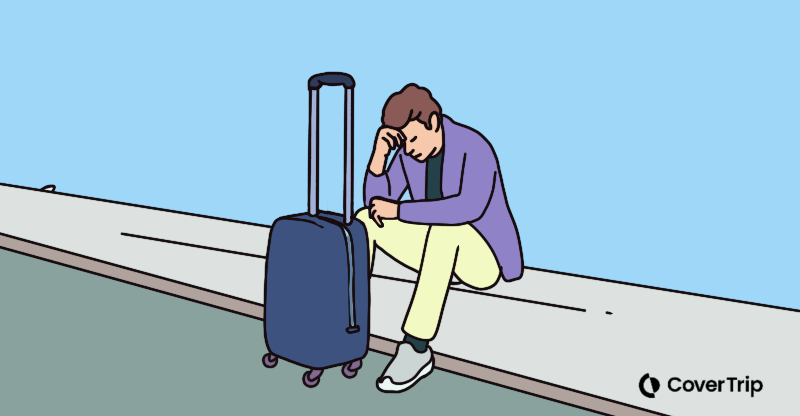How to avoid 9 common mistakes on your first trip abroad
25 August 2022
Traveling abroad for the first time, or perhaps for the first time in awhile? You’re not alone. The US Travel Association monthly statistics for July indicates that overseas travel improved slightly from the May and June numbers.
With cheap flight tracking services like Scott’s Cheap Flights tempting American travelers with deals and the kids heading back to school, you may be considering it. The fall shoulder season is, after all, one of the most popular times to travel abroad. Or, perhaps you know a student who is heading abroad for the first time on study abroad.
Note: I make zero money on that referral above. I just really like their approach and cheeky Instagram.
Either way, whether you haven’t traveled abroad since the pandemic or you’ve never ventured beyond the borders of your home country, here’s what you need to know to avoid big travel mistakes.

1. Waiting to check your passport expiration
I have to admit, I’m guilty of this one. The second you start considering a trip abroad, you should check your passport’s expiration date.
Here’s a few reasons why:
- Many countries require your passport to be valid for up to six months after your intended return date.
- Passport renewal time frames are catching up to pre-pandemic speed but can still take 8-10 weeks.
Some years ago, I had the unexpected opportunity to travel to Sweden. I waited a couple of beats before checking my passport and had to pay the extra fees to expedite renewing it. It was expensive and nerve-wracking and I never forgot it.
2. Not packing the right items
When you travel in your own country, you probably have no trouble figuring out what clothing to pack and you don’t need power adapters.
Before you travel abroad, you need to check the voltage for the countries you’ll be staying in and those you may be traveling through enroute. Nothing’s worse than getting delayed overnight in Zurich with an adapter that only works somewhere else and needing to charge your phone.
You’ll also want to do some research on what locals wear in the country you plan to visit. Check what’s expected based on your gender so you don’t feel out of place or stick out like a tourist.
3. Choosing the wrong luggage
If you can’t carry your bag up several flights of stairs without help, you’re gonna have a problem in many European countries. If you’re headed to a quaint city with cobblestone streets or an island with a long sand beach you have to traverse to get to your sweet bungalow, wheels on your suitcase will cause drag rather than speed things up.
Ask me how I know. 😉
4. Forgetting to check your phone or data plan
One of the most common questions travelers heading abroad ask is“What’s the best way to use my cell phone?”
This one is tricky because new developments are happening all the time, so you’ll need to do some research (travel forums are a great place to find this info).
- You can rent a phone at your destination – this is a popular for shorter trips and relatively cheap.
- You can use VoIP apps (like Skype and Whatsapp) to avoid roaming charges – this is popular for longer trips. Keep in mind, these apps need Wi-Fi access though.
- You can switch out the SIM card in your phone – this is popular and inexpensive but not all mobile devices can be unlocked to use a local SIM card.
- The latest option is an eSIM or a digital SIM that lets you activate a cellular plan from your carrier without having to use a physical SIM card. Essentially, it lets you change your wireless carrier through software so your phone works on the local network. Not all phones have this option, however, so you’ll need the latest and greatest.
5. Finding out your medication is illegal too late
If you take any prescription or over-the-counter medication, you should verify that it’s legal to bring it into the country.
If the news about Brittney Griner and Marc Fogel have taught us anything, medical cannabis isn’t welcome in every country.
But that’s not the only medication you have to think about. Here are some examples:
- Sudafed is illegal in Japan
- Codeine is illegal in Greece
- Benadryl (even in Tylenol PM) is illegal in Zambia and Japan
- Adderall is illegal in Saudi Arabia and Japan
- Ambien is illegal in Saudi Arabia and Nigeria and you’ll need to apply for a license to take it into Singapore
Even small amounts of many medications can cause big problems and the laws change often. The best way to find out if you can carry your medication into a country is to check the US embassy in that country.
Pro tip: you can ask your doctor for an official letter explaining the medical need, but that doesn’t always work, especially if it’s not translated into the local language.
6. Assuming you can access your money
Before you leave, make sure you will be able to access your money and know what the local rules are. In many rural places, for example, credit cards aren’t accepted so you’ll need cash.
- Check your bank’s ATM network at your destination and stopover locations.
- Inform your bank you’ll be traveling so they don’t accidentally block your account. (Many banks don’t require this step now, but check to be sure.)
- Find out whether your bank will charge international transaction fees.
You may be able to get foreign currency through your bank before your trip, but you also don’t want to be carrying around a lot of cash.
7. Not checking the weather
This sounds simple, but hear me out. If you’re not used to deep temperature dips at night, you won’t have a warm jacket when you need it in Paris. If you don’t check the typical weather in Bali in February, you probably don’t know that it’s very hot and muggy then.
Trust me, check the current weather conditions so you know before you go. You’ll be glad you did.
8. Assuming everyone speaks your language
While many people around the world know how to communicate in English, not everyone does (and shouldn’t be expected to). Learning some basic language for where you’re going will help you fit in.
Also have a translation app downloaded to your phone and practice using it before you go.
9. Not having a strategy for jet lag
Jet lag is no joke. It can take days to fully recover from the symptoms and that first 24 hours is really tough.
Keep in mind, the oxygen levels in most aircraft are typically lower than you normally breathe, and dehydration can also contribute to your jet lag symptoms.
Take some time to research jet lag and have a strategy for managing it. Some of the most common tips are:
- Drinking plenty of water before and during your travel
- Eat light, healthy snacks
- Move around regularly and stretch
- Avoid strong sleep aids on the flight
- Expose yourself to natural light as soon as you arrive
- Be prepared to go to bed early the first couple of nights on your trip
Even if you do make mistakes on your first trip abroad, and it’s likely you will, don’t let them ruin your trip entirely. Things may go wrong, but a good attitude can help you have a great time even when they do.
Related topics
Damian Tysdal is the founder of CoverTrip, and is a licensed agent for travel insurance (MA 1883287). He believes travel insurance should be easier to understand, and started the first travel insurance blog in 2006.
